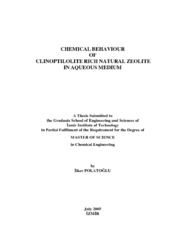Please use this identifier to cite or link to this item:
https://hdl.handle.net/11147/3358Full metadata record
| DC Field | Value | Language |
|---|---|---|
| dc.contributor.advisor | Özkan, Seher Fehime | en |
| dc.contributor.author | Polatoğlu, İlker | - |
| dc.date.accessioned | 2014-07-22T13:51:22Z | - |
| dc.date.available | 2014-07-22T13:51:22Z | - |
| dc.date.issued | 2005 | en |
| dc.identifier.uri | http://hdl.handle.net/11147/3358 | - |
| dc.description | Thesis (Master)--Izmir Institute of Technology, Chemical Engineering, Izmir, 2005 | en |
| dc.description | Includes bibliographical references (leaves: 70-73) | en |
| dc.description | Text in English; Abstract: Turkish and English | en |
| dc.description | xi, 77 leaves | en |
| dc.description.abstract | In this study the chemical behavior of natural zeolite from Gördes Türkey and its Na2CO3 treated form was investigated in acid (hydrochloric acid, lactic acid, acetic acid) and basic (sodium hydroxide) solutions. Synthetic gastric juice (hydrochloric acid and 0.4 % pepsin at pHi.2) was also prepared in order to examine the neutralizing capacity of zeolite for high acid concentration of stomach. The change in proton and hydroxyl concentration with time was studied by putting the different amount of zeolites into the various concentrations of acid and base solutions.It was found that natural zeolite tended to increase the pH of acidic solution while decreased the pH of basic solution depending on the concentration of proton or hydroxyl ions in solution and zeolite amount. The proton or hydroxide ions entered to the zeolite could not balance the cations released from zeolite structure. Therefore not only ion exchange, but also adsorption, cation hydrolysis, dissolution of Al and Si, complex formation and precipitation can be occurred. The neutralizing capacity of modified zeolite with sodium carbonate was higher than untreated ones. In the study conducted with synthetic gastric juice, 0.5 g modified zeolite did not significantly affect the pepsin activity of the medium and increased the pH to 2.9 which was between the normal ranges of stomach acid (2.9-3.1). In all aqueous studies conducted by using natural zeolite there was no change observed at the surface charge of the zeolite. According to characterizations performed it is understood that there was no significant change and the structure was stable. For these reason zeolite can be used as solid buffer in aqueous medium. | en |
| dc.language.iso | en | en_US |
| dc.publisher | Izmir Institute of Technology | en |
| dc.rights | info:eu-repo/semantics/openAccess | en_US |
| dc.subject.lcc | TN948.Z4 .P76 2005 | en |
| dc.subject.lcsh | Zeolites--Turkey--Gördes | en |
| dc.subject.lcsh | Clinoptilolite | en |
| dc.subject.lcsh | Ion exchange | en |
| dc.title | Chemical behaviour of clinoptilolite rich natural zeolite in aqueous medium | en_US |
| dc.type | Master Thesis | en_US |
| dc.institutionauthor | Polatoğlu, İlker | - |
| dc.department | Thesis (Master)--İzmir Institute of Technology, Chemical Engineering | en_US |
| dc.relation.publicationcategory | Tez | en_US |
| item.fulltext | With Fulltext | - |
| item.grantfulltext | open | - |
| item.languageiso639-1 | en | - |
| item.openairecristype | http://purl.org/coar/resource_type/c_18cf | - |
| item.cerifentitytype | Publications | - |
| item.openairetype | Master Thesis | - |
| Appears in Collections: | Master Degree / Yüksek Lisans Tezleri | |
Files in This Item:
| File | Description | Size | Format | |
|---|---|---|---|---|
| T000352.pdf | MasterThesis | 1.14 MB | Adobe PDF |  View/Open |
CORE Recommender
Page view(s)
252
checked on Nov 18, 2024
Download(s)
120
checked on Nov 18, 2024
Google ScholarTM
Check
Items in GCRIS Repository are protected by copyright, with all rights reserved, unless otherwise indicated.